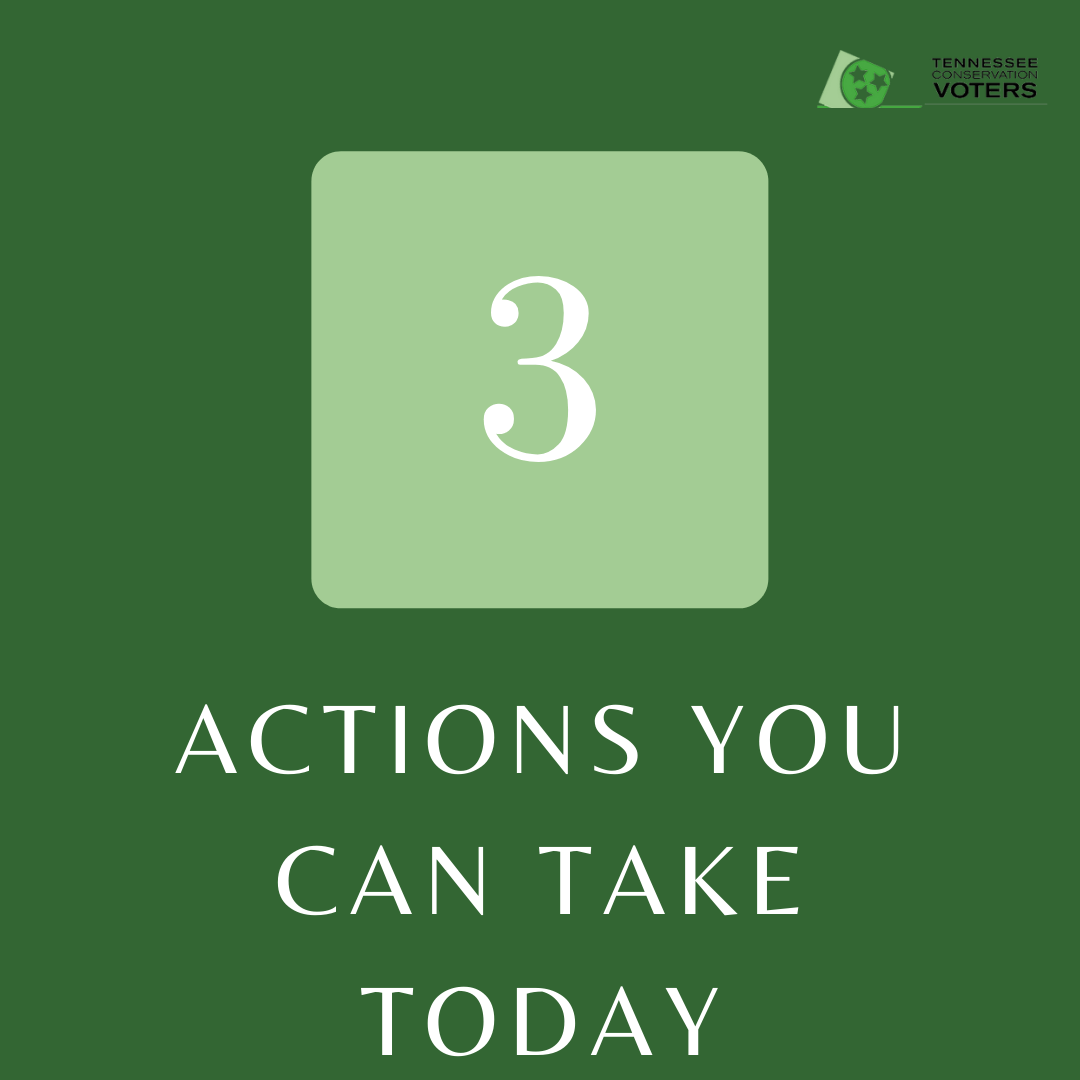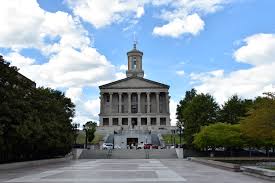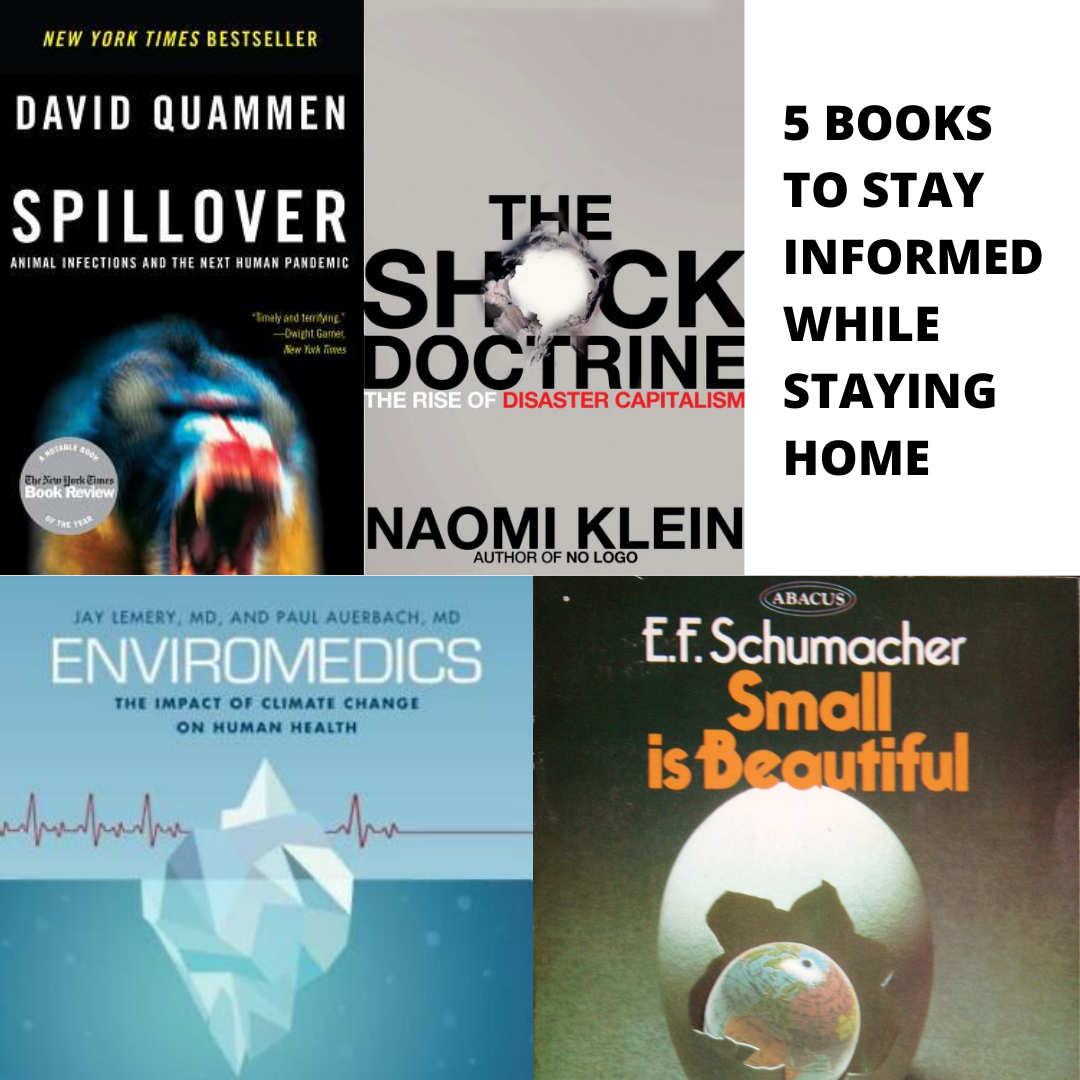TCV'S Webinar on Key Environmental Bills
Tennessee Conservation Voters hosted a webinar focused on key environmental bills still to be decided by legislators. If you missed it, don't worry! The webinar is available to view on Youtube here.
The General Assembly is preparing to return soon, so now is a great time to catch up on anything you missed!

Commit to asking at least three people to join our TCV Legislative Emails Update List at https://www.tnconservationvoters.org/sign-up-for-updates . When we are well-organized and informed on conservation issues, our message and impact on legislation is more successful. Send a polite and professional email to your legislators today and when they arrive back in session in January 2022 to let them know you are a constituent, and you care about the environment. No matter how good or bad your legislators’ past votes have been on our issues, they need to know that their constituents care. Find your legislator by going to https://capitol.tn.gov and clicking “Find My Legislator”. Become a monthly donor today or make a one-time gift of $500, $250, or $100. Together, we have the power to build a healthier, more equitable future for everyone in Tennessee! DONATE HERE Mostly importantly, continue working and planning together to make sure we stand unified in the face of unprecedented threats to our environment.

In today’s social and political climate, there are countless injustices and grievances that may spark strong opinions. You may be developing your own personal philosophies and ideas surrounding a variety of topics, and you may feel impassioned and wish to share these thoughts on a broader scale than simply social media or dinner conversation. Perhaps you recently read an article that struck you deeply, that lit a fire within you, and you’ve drafted up a full response in your head. When it comes to an outlet for these feelings, there is no better option than writing a letter to the editor. What is a letter to the editor? While the name suggests it is a message written to the head of a magazine or newspaper, the title simply represents a brief piece of writing, usually persuasive or argumentative, that is written and sent in by a reader of a particular publication. These letters can be a great addition to your personal advocacy and a way to have your voice heard. The ACLU states on their website that “in addition to writing letters to members of Congress, sending letters to the editor is an important advocacy goal because they reach a large audience, are often monitored by elected officials, can bring up information not addressed in a news article, and create an impression of widespread support for or opposition to an issue.” This means that you have the potential to shift the opinion of not only readers but also representatives and policy makers. So, you are fired up and ready to write. What makes a good letter? You may have read op-eds in magazines in the past, or longer essays written by authors with fancy credentials taking clear stances on issues. In contrast to op-eds, letters to the editor are much shorter and often written by “normal people”- those who may not be journalists or published writers already, but who have strong arguments to make. If you are ready to put your pen to paper (or perhaps your fingers to the keyboard), here are five tips on writing an effective and convincing letter to get you started: Tip one, from the Sierra Club: “Choose local or national publications that you read or know reasonably well. If writing to a local publication, it may help to be a resident of the circulation area.” This tip is particularly helpful when it comes to making sure your efforts are not wasted. After all, a publication such as the New York Times receives thousands of submissions daily and only around 15 are published. You may have a better chance of being published in a local newspaper or magazine, and in turn, you can focus on a local issue and perhaps effect more direct change in your community. Tip two, from the New York Times editor Thomas Fayer: “Write quickly, concisely and engagingly. We're in an age of fast-moving news and virtually instant reaction; letters about an especially timely topic often appear within a day or two (and almost always within a week).” Make sure you are staying up to date with current issues and you will have a higher chance of being published. If you are directly responding to a published article, you only have a couple of days before it is no longer relevant. Also, most LTEs are quite brief, coming in at around 150-300 words. This means you will have to whittle down your argument and have a clear point of view. Tip three, from the University of Kansas Community Toolbox: “Your opening sentence is very important. It should tell readers what you’re writing about, and make them want to read more. Explain what the letter is about at the start. Don't make the editor or the general public wait to find out what you want to say. Tell them your key point at the beginning.” As previously mentioned, these letters are brief, and therefore having an engaging and clear first sentence can allow you space to dive into nuance later. Tip four, from FreeSpeechforPeople.org: “Don’t use pejoratives (insulting your opponents), avoid jargon or acronyms, and omit needless words. Don’t say "I’m writing to…" or "I think…" It’s obvious.” With such a small word count, it’s important to use words strategically. You must be thoughtful with your choices, and remove non-essential words. As it is opinion based and authored by you, you are able to directly state your thoughts without clarifying. Tip five, from the National Resources Defence Council: “Newspaper editors typically select letters to the editor that are authentic and personalized, so don’t be afraid to open up and use your own voice as you draft your LTE. Making personal opening statements helps establish the writer’s credibility as someone with firsthand knowledge of the given issue and grabs the reader’s attention.” If you have a personal story or experience directly relating to your argument, this can win over readers as well as an editor. Even if you implement all these tips, there is still a chance your letter will not be published on your first try. Do not give up! There are often many other people sending in letters about the exact same thing and only so many can be shared. Continue to hone your writing skills and speak out for or against the causes which you are passionate about and eventually you will be noticed. Start small, with local newspapers and magazines, and take wins as they come! Armed with this information, you are now ready to go forth into the world and make your written mark. Happy letter writing!

Presented by longtime environmental lobbyist Stewart Clifton, the webinar includes an overview of the structure and purpose of the state legislature, tips and tricks for effective citizen advocacy, and recommendations for developing strong relationships with your representatives. The "Tennessee General Assembly 101" Webinar is available to view on Youtube here .

It’s hard to ignore the ways in which the novel coronavirus COVID-19 pandemic has created a new reality for people around the world. This reality includes social distancing and stay-at-home orders intended to prevent the spread of the virus. There are challenging restrictions on our abilities to move freely and do everything we’re used to. Yet there’s always a silver lining to be found in any situation, even one as frustrating as this! While there’s no way around the rules we must follow to help our communities, many are using this time to take up a new hobby or restart an old one. This is a great chance to make intentional choices about how you’ll fill up the days at home. That includes reading a great book and learning something new, as many of us here at TCV are doing. Here are 5 book suggestions you may want to check out! Some are relevant to our specific situation, some are challenging political narratives, and some are simply uplifting. Sit down with a cup of tea or coffee and dive in! The Shock Doctrine by Naomi Klein The Author: Naomi Klein is a Canadian author, social activist, and filmmaker known for her political analyses and criticism of corporate globalization and of capitalism. Quote: “Extreme violence has a way of preventing us from seeing the interests it serves.” Why We Recommend It: In this eye-opening expose, Klein discusses a phenomenon called “Disaster Capitalism,” which is the way that disasters are exploited by those in power to advance their economic interests in times of trauma. It is an engaging read by a brilliant author, more relevant than ever today for those curious about the way coronavirus will affect our society. Amazon Description: In this groundbreaking alternative history of the most dominant ideology of our time, Milton Friedman's free-market economic revolution, Naomi Klein challenges the popular myth of this movement's peaceful global victory. From Chile in 1973 to Iraq today, Klein shows how Friedman and his followers have repeatedly harnessed terrible shocks and violence to implement their radical policies. As John Gray wrote in The Guardian, "There are very few books that really help us understand the present. The Shock Doctrine is one of those books." Small Is Beautiful: Economics as if People Mattered by E. F. Schumacher The Author: Ernst Friedrich Schumacher was a German-British statistician and economist who is best known for his proposals for human-scale, decentralised and appropriate technologies. Why We Recommend It: Small is Beautiful is a collection of essays outlining E.F. Schumacher's philosophy on modern economic, ecological, and spiritual thinking. Its strength lies in Schumacher's ability to elegantly and intelligently question many assumptions of modern economics, highlighting some of the fallacies. As communities everywhere struggle to balance economic security and public health, the lessons of this book prompt us to consider alternative ways of organizing society to allow human life to flourish. Quote: “An attitude to life which seeks fulfilment in the single-minded pursuit of wealth - in short, materialism - does not fit into this world, because it contains within itself no limiting principle, while the environment in which it is placed is strictly limited.” Amazon Description: Small Is Beautiful is Oxford-trained economist E. F. Schumacher’s classic call for the end of excessive consumption. Schumacher inspired such movements as Buy Locally and Fair Trade, while voicing strong opposition to casino capitalism and wasteful corporate behemoths. Named one of the Times Literary Supplement’s 100 Most Influential Books Since World War II, Small Is Beautiful presents eminently logical arguments for building our economies around the needs of communities, not corporations. Enviromedics: The Impact of Climate Change on Human Health by Jay Lemery, MD, and Paul Auerbach, MD. Authors : Jay Lemery, MD, and Paul Auerbach, MD are both professors at the University of Colorado and Stanford University, respectively. They are specialists in the way that climate change affects human health. They each have years of experience and accolades within the field of environmental health sciences. Why We Recommend It: This thought-provoking book tackles the climate crisis through the lens of public health. As coronavirus has spread through the world, it is more important than ever to understand how climate change will affect the geographic range of vector-borne illnesses and the growing effect these illnesses will have. Quote: "The individuals and interests who typically stand to benefit from a polluting activity are not the same as the ones who will suffer the adverse health and other consequences." Amazon Description: There is a growing understanding that climate change is impacting a broad range of health outcomes. Two emergency medicine experts have assembled evidence from several disciplines to demonstrate that politically motivated national and corporate behavior is creating dire consequences for global health. The information is presented in 15 chapters that tackle such diverse topics as vector-borne diseases, extreme weather, mental health, algal blooms, and food and water security. Though their backgrounds are in medicine, the authors' climate science is sound, with an appropriate emphasis on biodiversity and environmental justice. Living Beautifully: with Uncertainty and Change by Pema Chodron Author: Pema Chödrön is an American Tibetan Buddhist. She is an ordained nun. Chödrön has written several dozen books and audiobooks, and is principal teacher at Gampo Abbey in Nova Scotia, Canada. Why We Recommend It: Our world as we know it is shifting and many of us are learning to adapt to new ways of life that may make us uncomfortable, frightened, or anxious. This book offers advice and comfort regarding uncertainty in life, and can offer a respite from the stress surrounding our current situation. Quote: “We have a choice. We can spend our whole life suffering because we can't relax with how things really are, or we can relax and embrace the open-endedness of the human situation, which is fresh, un-fixated, unbiased.” Amazon Description: We live in difficult times. Life so often seems like a turbulent river threatening to drown us and destroy our world. Why, then, shouldn’t we cling to the certainty of the comfortable—to our deep-seated habits and familiar ways? Because, Pema Chödrön teaches, that kind of fear-based clinging keeps us from the infinitely more powerful experience of being fully alive. The teachings she presents here—known as the “Three Commitments”—provide a treasure trove of wisdom for learning to step right into the unknown, to completely and fearlessly embrace the groundlessness of being human. When we do, we begin to see not only how much better it feels to live an openhearted life, but we find that we begin to naturally and more effectively reach out to help and heal all those around us. Spillover: Animal Infections and the Next Human Pandemic by David Quammen Author: David Quammen is an American science, nature and travel writer and the author of fifteen books. His articles have also appeared in National Geographic, Harper's, Rolling Stone, the New York Times Book Review and other periodicals. Why We Recommend It: Though it was written in 2012, this book couldn’t be more relevant to our current situation. Quammen proposed that the next pandemic would come from a virus spread by animals, which is likely what happened with COVID-19. This book ties together politics, public health, and the environment into a neat yet chilling package that will help us understand how diseases like this happen. Quote: “Made no mistake; they are connected, these disease outbreaks coming one after another. And they are not simply happening to us; they represent the unintended results of things we are doing. The first crisis is ecological, the second is medical.” Amazon Description: A New York Times Notable Book of the Year, a Scientific American Best Book of the Year, and a Finalist for the National Book Critics Circle Award. Ebola, SARS, Hendra, AIDS, and countless other deadly viruses all have one thing in common: the bugs that transmit these diseases all originate in wild animals and pass to humans by a process called spillover. In this gripping account, David Quammen takes the reader along on this astonishing quest to learn how, where from, and why these diseases emerge and asks the terrifying question: What might the next big one be? We hope you enjoy these books, and find some time to engage with a new or challenging topic. Stay healthy, stay at home, and stay informed!

On the 50th anniversary of Earth Day, Tennessee Conservation Voters' staff and board members were proud to share a video message reflecting on the decades we have spent educating and training citizens, advocating for responsible environmental policies, and holding our state's legislators accountable for protecting Tennessee's precious natural resources. Watch the video message here .

In case you missed it, TCV interviewed one of our newest board members, Everett Davis, on Instagram Live! Everett has an MS in Sustainability is the current Sustainability Coordinator with Music City Center. Tune in as he shares his experiences with energy efficiency, environmental compliance, field research, and mountain guiding! Watch the Interview Here
